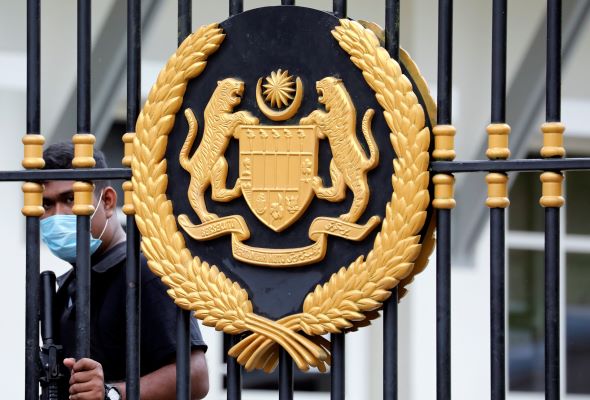
Published in Astro Awani & Asia News Today, image by Astro Awani.
Certain quarters have been calling for the establishment of a National Operations Council (NOC) – on the basis that the government of the day has ostensibly “failed” in curbing the outbreak and transmission of Covid-19 with the surging cases and increased deaths.
They rest their argument on the historical precedent of 1969 when the nation was tragically embroiled in inter-ethnic clashes that resulted in bloodshed and mayhem. Upon the Proclamation of Emergency under Article 150 of the Federal Constitution, the Yang Di-Pertuan Agong proceeded to delegate and vest executive authority with a “Director of Operations” and who’s assisted by an NOC.
It’s argued that Article 40 of the Federal Constitution whereby the Yang Di-Pertuan Agong “shall act in accordance with the advice of the Cabinet or of a Minister acting under the general authority of the Cabinet …” doesn’t apply under the Emergency.
Historically speaking, proponents of NOC point to the so-called “fact” that the Yang Di-Pertuan Agong made the appointment without waiting for Parliament to convene – fresh from the general election.
They then deduce from this (temporal sequence) the logical conclusion that the Yang Di-Pertuan Agong, therefore, has ultimate authority and power during times of Emergency whilst recognising that this doesn’t apply under ordinary situations. Thus, proponents of NOC concede that Article 40 is to be read according to its natural and literal meaning but with the proviso that it’s only limited to ordinary (i.e., non-Emergency) situations.
What they failed to mention is that as a constitutional monarch, the Yang Di-Pertuan Agong has to act according to and within the ambit of the Federal Constitution as the supreme law of the land, as per Article 4.
To be sure, in agreement with proponents of NOC, being a constitutional monarch doesn’t mean that the Yang Di-Pertuan Agong is constitutionally constrained from exercising any real power at all.
This is where the logic of the proponents of NOC is somewhat “amorphous”, for lack of a better term.
It’s true the Yang Di-Pertuan Agong can “refuse” (on a limited basis) the advice of the Prime Minister under certain circumstances such as on the proclamation of an emergency and dissolution of Parliament to make way for a general election.
However, such exercise of power doesn’t automatically or by default entail that the Yang Di-Pertuan Agong would be able to unilaterally willed to establish a National Operations Council (NOC), albeit to be sure, under the Emergency.
Firstly, to repeat a truism.
The authority and right of the Yang Di-Pertuan to declare and proclaim an Emergency comes under Article 150 of the Federal Constitution.
For example, Article 150(2A) reads: “The power conferred on the Yang di-Pertuan Agong by this Article shall include the power to issue different Proclamations on different grounds or in different circumstances, whether or not there is a Proclamation or Proclamations already issued by the Yang di-Pertuan Agong under Clause (1) and such Proclamation or Proclamations are in operation”.
If the “higher” power of the Yang Di-Pertuan Agong to proclaim an Emergency is derived not “internally” (absolute) but “externally” (relative), i.e., from the Federal Constitution itself, how could the logic of a “lesser” power (i.e., under the Emergency) to establish or form a NOC – apart from the advice of the Prime Minister or the Executive – be understood to apply in absolute terms?
Secondly, Article 40(1) reinforces this position.
If we were to read further, we find that “In the exercise of his functions under this Constitution or federal law the Yang di-Pertuan Agong shall act in accordance with the advice of the Cabinet or of a Minister acting under the general authority of the Cabinet” extends to “except as otherwise provided by this Constitution”.
Again, the monarchical role of the Yang Di-Pertuan Agong is strictly defined and circumscribed by the Federal Constitution. According to this Article, no where does the Yang Di-Pertuan Agong has the capability to act unilaterally.
Coming back to the historical facts.
The establishment of the NOC came after the Proclamation of Emergency. This is something that both proponents and opponents of NOC can agree.
But there’s more than meets the eye.
That’s to say, the same people who advised the Yang Di-Pertuan Agong to proclaim the Emergency were, of course, the same people who advised him to establish the NOC with the then Deputy Prime Minister Tun Abdul Razak Hussein as the Director of Operations.
The logic of the facts can’t be just swept away.
In other words, there’s a continuity here which the proponents of NOC wilfully ignore. And which is that the establishment of the NOC sits on the same basis as the proclamation of the Emergency, namely the advice of the Prime Minister (backed by the Cabinet).
Therefore, how can the 1969 scenario be used as the basis to advocate for establishment of an NOC which decision is independent and apart from the advice of the Prime Minister?
The wording of the Ordinance No. 1 (1969) makes it clear: “An Ordinance promulgated by the Yang Di-Pertuan Agong under Article 150(2) of the Federal Constitution”. It means that:
1. One can’t simply divorce the Yang Di-Pertuan Agong’s powers during ordinary, i.e., non-Emergency times from his powers during extraordinary i.e., Emergency times. The Federal Constitution doesn’t provide for such a distinction – for otherwise the Article concerned wouldn’t have been inserted in the first place. And Ordinance No. 1 (1969) wouldn’t have contained the said wording.
2. All ordinances under Article 150(2C) are made by the Yang Di-Pertuan Agong in accordance with the Federal Constitution – and, therefore by extension, based on the advice of the Prime Minister.
It’s to be noted that even where an Ordinance or provision therein could be inconsistent with any provision of the Federal Constitution, Article 150(6) provides for derogation or exemption. In other words, here the Federal Constitution specifically or explicitly constrains itself – to allow for any inconsistencies by an Ordinance or provision therein.
This is merely to highlight that any exercise of power by the Yang Di-Pertuan Agong has to be in accordance with the Federal Constitution. And any exception thereof must of and in itself be subject to the same Federal Constitution.
Article 150 is completely silent on the unilateral power of the Yang Di-Pertuan Agong or specifically on his majesty’s power to form a government (other than the government of the day), e.g., in the form of an NOC.
In summary, the argument put forward by proponents of NOC that under the Emergency, the Yang Di-Pertuan Agong is automatically or by default the ultimate authority (and by implication, irrespective of the Federal Constitution) can’t be sustained or doesn’t carry constitutional weight.
This is because the Federal Constitution is the supreme law of the land.
The exercise of power by the Yang Di-Pertuan Agong is correlated to the Federal Constitution.
And, finally, the Federal Constitution doesn’t recognise a situation where the powers of the Yang Di-Pertuan Agong can be differentiated between ordinary and extraordinary situations.
Jason Loh Seong Wei is Head of Social, Law & Human Rights at EMIR Research, an independent think tank focussed on strategic policy recommendations based on rigorous research.

